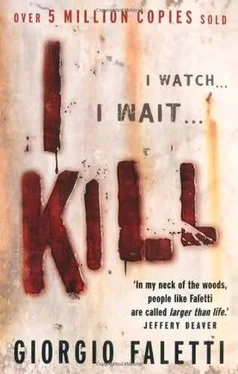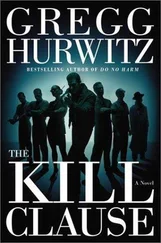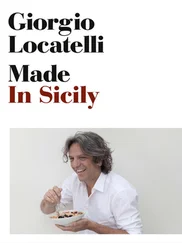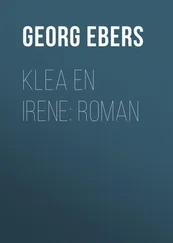Suddenly, Frank could see Jean-Loup’s face in his mind and he remembered the good impression the young man had made on him from the very beginning. He could see his traumatized face at the station, bent over the table sobbing after one of the phone calls. He could hear the echo of his weeping, and in his memory it sounded like the mocking of an evil spirit. He remembered the friendly way he had spoken to Jean-Loup in his garden, trying to convince him not to quit the radio show, little knowing that he was persuading him to continue his killing spree.
Through the closed door, he thought he could get a whiff of Jean-Loup’s cologne that he had smelled so many times when standing near him, a light fresh scent of lemon and bergamot. He thought that, perhaps, if he placed his ear to the metal, he might hear Jean-Loup’s natural voice, warm and deep. It would seep through the thickness of the metal and again whisper the words that were branded on their brains.
I kill…
Frank felt a terrible rage rise up inside him, fed by a sense of deep frustration for all the victims of that man, Jean-Loup, No One, or whoever he was. It was such a deep anger that he felt he could just grab hold of the metal door with his bare hands, crush it like aluminium foil, and seize the throat of the man standing behind it.
A series of thuds brought him back to the reality that his red mist had momentarily obscured. Lieutenant Gavin was hitting the metal door at various points, listening to the different echoes. Then he turned to them with the expression he used for unpleasant situations.
‘Gentlemen, I hope my colleague who is coming with the explosives will prove me wrong. I don’t like to be the bearer of bad news all the time, but first I’d try talking to the person inside, if he’s in there. We’ve got to convince him that he’s been discovered and that there’s no hope. I’m afraid that if he doesn’t decide to open up of his own accord, it’ll be fairly complicated to get him out. If we want to use explosives to get through these doors, we’d need enough to blow up a half a mountain.’
The man is safe in his secret hiding place, in that metal and cement box that someone dug deep under the ground long ago in fear of something that never happened. Ever since he discovered its existence, almost by accident, ever since he went inside for the first time and realized what it was and what it was for, he has kept his refuge in perfect working condition. The storeroom is full of tinned food and mineral water. There is a simple but efficient waste recycling system that would allow him to filter and drink his own urine, if necessary. The air is purified by chemical filters and reactants, and there is no need for contact with the outside world. His food and water supply will last for more than a year.
He goes out only occasionally, in darkness, with the sole purpose of breathing the pure air and smelling the perfume of summer, only slightly contaminated by the odour of the night, his natural habitat. The heady scent of a lavender bush in the garden triggers memories of boyhood fears, recurring dreams of a dark staircase. His mind selects these associations, like a record silently chosen from the others and slipped into place by the mechanical arm of a jukebox.
He moves in total silence in that house where he does not need light to see. Sometimes he goes out on to the terrace and, leaning against the wall, hidden in the shadow of the house, he raises his head to observe the stars. He makes no attempt to read the future, and is simply happy to admire the luminous twinkling in that fragment of the present. He doesn’t ask what will happen to him, or to them. It is not thoughtlessness or indifference, only awareness.
He doesn’t blame himself for making a mistake; he was sure that he would make one sooner or later. It is the law of chance applied to the fleeting life of a human being, and someone had taught him long ago that you pay for your mistakes. He had been forced to learn it the hard way.
And he, that is, they, had paid for their mistakes. More harshly every time, with heavier punishments as they grew older and their margin of error became more and more restricted until finally they met with complete intolerance. The man was inflexible, but in his presumption he forgot that he too was only a man. And that mistake had cost him his life.
He survived and that man did not.
He returns to his hiding place after those brief ventures outside and he waits. The dark metal lining makes it seem like a nocturnal place, as though he lets the darkness in through the door every time he opens it. When the door is closed the night is perpetuated for a little longer, and his isolation is complete.
Yet he does not feel the heaviness of waiting or of solitude. He has music and the company of Paso. And that is enough.
Yes, Vibo and Paso.
He no longer remembers when they invented those two meaningless nicknames. There may have been a precise reference, but it was probably just the randomness of it that they liked. A flash of youthful fancy with no need for explanation. Like faith, it was either there or it wasn’t.
With closed eyes, he listens to Led Zeppelin’s ‘Stairway to Heaven’, a rare live recording. He sits in the office chair, slowly rocking back and forth, following the melody that evokes a slow, gruelling climb, step by step, towards the sky. The stairway exists, but heaven might not.
In the other room, the corpse is still lying in its crystal coffin as if in suspended animation, waiting to be reawakened at the end of the journey that will never come. Maybe he hears the music too, or maybe he misses its finer points, wrapped in the new face, the last one procured to satisfy his understandable vanity. This false image, like all the others, will soon decompose. Then he will have to do something about it, but for now there is still time, and Robert Plant’s voice is his only priority.
The track ends. He leans on the wooden surface and stretches out his hand to press STOP. He doesn’t want to hear the rest of the record. One song is enough. He will turn on the radio and listen to voices from the outside world.
In the sudden silence following the music, he thinks he hears a series of rhythmic blows, as though something from outside is hammering on the door, causing a faraway series of echoes. He gets up from the chair and goes over to the door. He puts his ear to it and feels the cold of the metal against his skin. The blows are repeated and then, right afterwards, he can hear a voice shouting. The words from outside are indistinct, as from a great distance, but he is well aware that they are meant for him. He cannot make them out, but he guesses their meaning. The voice is certainly telling him to open the door of his refuge and surrender, before…
He takes his ear from the door with a smile. He is well aware that they are serious. He knows that there is not much they can do to get him out, but he also knows that they will do whatever they can. What they don’t know is that they will never catch him. At least not alive. He will never give them that satisfaction.
He walks away from the door and goes into the room where the corpse in the transparent cabinet seems to have a new lifelike tension instead of its normal stillness. There appears to be a hint of anxiety on the expressionless mask covering its face. He thinks that the expression must once have belonged to the man who had the face before. Now it is nothing but an illusion. Every emotion disappeared for ever, at the moment of his last breath.
There is a long, pensive silence. The man is silent, too, waiting. Several minutes pass. All eternity stretches before the dead, for whom time has no meaning. For the living, however, several minutes can last a lifetime. The voice in his head returns and asks the question he is afraid to hear.
Читать дальше










